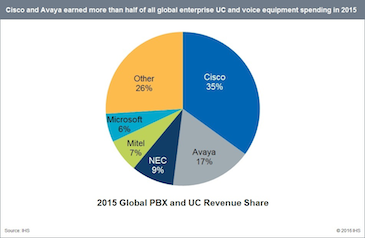 Longer business cycles and the move to cloud alternatives have caused the global enterprise telephony and UC market to dip 1% in Q4 2015, and drop 5% for the full-year to $7.4bn.
Longer business cycles and the move to cloud alternatives have caused the global enterprise telephony and UC market to dip 1% in Q4 2015, and drop 5% for the full-year to $7.4bn.
According to IHS Technology's latest figures, north America notched up 6% growth for the year, while the rest of the world recorded an 11% fall.
Pure IP PBXs were the only segment to post year-over-year growth (6%), but it remains almost half the size of the hybrid segment.
"Though UC demand has been strong over the past two years, revenue came to a halt in 2015, falling 2%," said Diane Myers, Senior Research Director.
"The decline is attributable to pricing drops as more and more UC functionality is incorporated into PBX packages, the move of UC applications to the cloud and the general competitive environment."
IHS Technology's research also found that PBX line shipments were slightly down in 2015; and hybrid IP PBXs (which appeal to businesses that want to minimise upfront capital outlays on handsets) continue to dominate; and UC platform licenses grew 10% last year.
"As enterprises migrate to IP and UC solutions, the top PBX vendors remain in a battle to gain customers and hold onto existing ones," added Myers.
"Cisco led all vendors for the full year 2015 (35% share), followed by Avaya (17%). On the UC front, Microsoft continues to have strong sales, which it looks to carry over to the voice side."

 Paul Clark has stepped in as VP and MD of Plantronics' Europe and Africa business, taking over from Philip Vanhoutte who exits this month following a 12 year stint with the firm. Clark previously led the Northern and Eastern Europe, Russia and Sub-Saharan Africa regions.
Paul Clark has stepped in as VP and MD of Plantronics' Europe and Africa business, taking over from Philip Vanhoutte who exits this month following a 12 year stint with the firm. Clark previously led the Northern and Eastern Europe, Russia and Sub-Saharan Africa regions. New Star Networks (NSN) Channel Director Ryan Kersey cracked open the bubbly to celebrate NSN's most profitable bill run since the business launched in December 2010, driving record breaking revenue and margins from the channel operation.
New Star Networks (NSN) Channel Director Ryan Kersey cracked open the bubbly to celebrate NSN's most profitable bill run since the business launched in December 2010, driving record breaking revenue and margins from the channel operation.